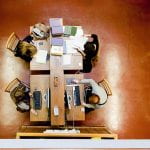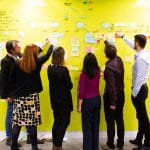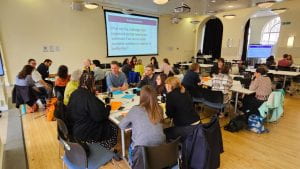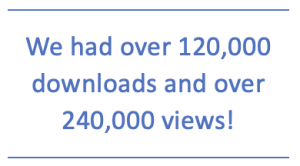Celebrating Open Science & Scholarship at UCL: Highlights from the Third Annual Awards Ceremony!
By Naomi, on 29 October 2025

Photo by Kirsty Wallis
On the afternoon of 22nd October 2025, 40 people gathered in Bentham House to celebrate the winners and honourable mentions of this year’s UCL Open Science and Scholarship Awards.
Sandy Schumann and Jessie Baldwin, the UKRN Local Network Leads at UCL, hosted the ceremony and awards were presented by David Shanks, UCL’s UKRN Institutional Lead. Sandy began by congratulating this year’s cohort – 69 applications were submitted for consideration this year, so the competition was fierce! She also thanked the judges, as well as UCL Press for sponsoring the event.
There were five categories in total, and after the awards were presented, the overall winner of each category showcased their project.

Photo by Kirsty Wallis
The first category was, ‘Activities Led By Non-Academic Staff’, won by Vassilis Sideropoulos (Senior Research Technical Professional, Department of Psychology and Human Development, IOE) for his work establishing an open research training programme and practice community within the IOE. Vassilis saw the need to make open research practical and relevant, and created a programme with modular training covering topics such as Data Management and Pre-Registration. Following feedback on the initial training programme delivered between 2019-2023, he spent 18 months considering how to improve it, which led to a revamped programme with more applicable guidance. Alongside this, he recognised that researchers were seeking a community, a place where they could reach out to someone who could train them and respond to their questions, which led him to establish an open research practice community.
To encourage engagement with the practice of open science, an understanding of what researchers need is vital. By listening and responding to feedback, Vassilis recognised this and has created a programme that has transformed the ways in which IOE researchers engage with and understand open science.

Photo by Kirsty Wallis
The winner of the second category, ‘Activities by academic staff (including post-docs) or PhD students: Open-source software/analytical tools’, was Deyu Ming (Lecturer in Mathematics and Data Analytics, School of Management, Faculty of Engineering) for the development of the open-source package ‘DGPSI’, which allows for scalable surrogate modelling of expensive computer models and model networks. In his showcase, Deyu took us on the journey of this project. From the origins of the idea in 2019, to translating it into something that others could use and publishing it on GitHub in 2020, to it subsequently appearing on the python package index and on CONDA in 2022. But it didn’t stop there. In 2023, the package started making considerable impact through the UKRI-funded projects Net Zero Plus and ADD-TREES, which support AI-enhanced tree-planting decision tools used by DEFRA, Forest Research, the National Trust, and other stakeholders to advance the UK’s Net Zero 2050 goals.
Since 2021, there have been 19 releases of the software, and it is now 60x faster than the original. As creator, lead developer, and sole maintainer of ‘DGPSI’, Deyu has worked incredibly hard on this open-source software, and with already over 100,000 downloads, it will no doubt continue to make a resounding and long-lasting impact.

Photo by Kirsty Wallis
The award for ‘Activities led by undergraduate or postgraduate students’ went to Yinan Chen, Eric Chen and Adelina Xie (undergraduate students at the Department of Statistical Science, Faculty of Mathematical and Physical Sciences) for developing an open peer-review system for statistical science undergraduate coding assignments as part of a UCL ChangeMakers project. The problem they set out to address was the limitation in Moodle (the learning platform used at UCL) with regard to peer review, as students could only receive general feedback on coding assignments. Since Moodle only supports the review of PDF outputs and not raw R code, there was no option for line-by-line code reviews, and they felt that collaborative learning opportunities were being missed. Their solution: GitHub and Moodle integration. This innovative hybrid approach, with GitHub’s powerful code review system and Moodle’s familiar interface, has led to a practical, accessible and scalable tool designed for students, by students.
This is a recently concluded pilot project, but it is already having significant impact. A paper is being written on it for the Journal of Open-Source Education, and it has attracted interest for presentation at the Royal Statistical Society’s education conference, which shows its potential for nation-wide statistical education – testament to Yinan, Eric and Adelina’s hard work and dedication. Alongside this, their commitment to the practice of open science at such an early stage in their academic career was inspiring to see.

Photo by Kirsty Wallis
For the category ‘Activities led by academic staff (including post-docs) or PhD students: Open publishing’, the award was presented to Adam Crymble (Lecturer of Digital Humanities, Department of Information Studies, Faculty of Arts and Humanities), for the open publishing initiative ‘Programming Historian’ which he co-founded. Programming Historian offers over 250 peer-reviewed tutorials for digital humanities in English, Spanish, French, and Portuguese. Adam explained how a gap in digital skills amongst humanities professionals was the motivation for the project, and from its humble beginnings as a blog, it has become a financially self-sustaining open publisher. By offering practical applications and case studies in each tutorial, as well as ensuring translations are culturally adapted, this project has had far-reaching influence and continues to do so.
Since the outset, community and collaboration have been vital in the development of Programming Historian, and Adam has worked hard to expand the project’s global community and to ensure inclusivity. This approach, alongside the use of open peer review and the promotion of open data and open-source tools, epitomises the principles of open science and was fantastic to hear about.

Photo by Kirsty Wallis
The final category was ‘Activities by academic staff (including post-docs) or PhD students: Enhancing open science and reproducibility capacity in the academic community’, won by Martin Mokros (Lecturer in Earth Observation, Department of Geography, Faculty of Social and Historical Sciences) for his COST Action 3DForEcoTech project. Four years ago, Martin noticed the issue of scientists undertaking similar forest ecosystem research but not talking to each other about it. He wanted to standardise laser scanning technologies for forest ecology and inventory to allow for collaboration, and so launched COST Action 3DForEcoTech – the first global open-science network focused on ground-based 3D forest monitoring. With over 600 members from 50+ countries, the reach is impressive, and it is an innovative approach to scientific practice. Open science was a key motivation for the project, and it incorporates fully accessible datasets, algorithms and benchmarks results, as well as open-source software and an algorithm library.
Alongside the provision of open data and tools, this project has engaged with open science by creating equitable access to knowledge and opportunities through supporting ECRs, enforcing gender balance and ensuring participation from underrepresented regions. The idea of equitable access underpins the entire concept of open science, and by making it a central tenet to the COST Action 3DForEcoTech project, Martin has provided an excellent example of how this can be done.
Each of these award winners have advocated for, harnessed and showcased open science in various fields of research and study, and we are delighted that they have received recognition with a UCL Open Science & Scholarship Award.
We are looking forward to hearing about these projects’ ongoing impact and wonder what new initiatives they might inspire!
The UCL Office for Open Science and Scholarship invites you to contribute to the open science and scholarship movement. Stay connected for updates, events, and opportunities.
Follow us on Bluesky, LinkedIn, and join our mailing list to be part of the conversation!
 Close
Close









 We would like to
We would like to 


































